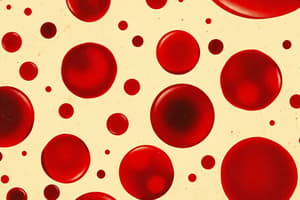Podcast
Questions and Answers
What is the primary function of blood?
What is the primary function of blood?
- To aid in digestion
- To carry oxygen and nutrients to the cells (correct)
- To regulate body temperature
- To transport carbon dioxide exclusively
What percentage of plasma is composed of water?
What percentage of plasma is composed of water?
- 91% (correct)
- 85%
- 95%
- 75%
Which type of blood cell is primarily responsible for oxygen transport?
Which type of blood cell is primarily responsible for oxygen transport?
- Platelets
- Erythrocytes (correct)
- Leukocytes
- Plasma cells
How long is the normal lifespan of a red blood cell?
How long is the normal lifespan of a red blood cell?
What type of plasma protein is involved in blood clotting?
What type of plasma protein is involved in blood clotting?
Which type of white blood cell fights infections?
Which type of white blood cell fights infections?
Approximately what percentage of carbon dioxide (CO2) is transported in the plasma as bicarbonate ion (HCO3-)?
Approximately what percentage of carbon dioxide (CO2) is transported in the plasma as bicarbonate ion (HCO3-)?
What is the normal count of leukocytes in the blood?
What is the normal count of leukocytes in the blood?
What is the primary role of neutrophils in the body?
What is the primary role of neutrophils in the body?
Which type of white blood cell is primarily involved in allergic reactions and parasitic worm infections?
Which type of white blood cell is primarily involved in allergic reactions and parasitic worm infections?
What is the normal percentage range of basophils in the body?
What is the normal percentage range of basophils in the body?
Which statement regarding monocytes is true?
Which statement regarding monocytes is true?
Which vitamin is necessary for the production of prothrombin in blood clotting?
Which vitamin is necessary for the production of prothrombin in blood clotting?
Which type of muscle tissue is striated and under voluntary control?
Which type of muscle tissue is striated and under voluntary control?
What distinguishes cardiac muscle from other muscle types?
What distinguishes cardiac muscle from other muscle types?
Which of the following is NOT a function of blood?
Which of the following is NOT a function of blood?
Flashcards are hidden until you start studying
Study Notes
Blood
- Blood is a specialized connective tissue composed of formed elements (blood cells) and blood plasma.
- Average blood volume: 4-5 L in females, 5-6 L in males; circulates approximately 1000 times daily.
- Main functions include transporting oxygen and nutrients to cells and removing waste products.
Blood Plasma
- Plasma acts as the liquid medium in blood, with 91% being water; remainder consists of salts and organic molecules.
- Major plasma proteins produced by the liver:
- Albumins (transport molecules)
- Globulins (immune function)
- Fibrinogen (blood clotting)
- Globulins consist of three types: alpha, beta, and gamma.
Cellular Elements of Blood
- Three main types of blood cells:
- Erythrocytes (RBCs):
- Biconcave, anucleate cells specialized for oxygen transport; normal count: ~5 million/ml.
- Lifespan of about 120 days; transport carbon dioxide (CO2) via hemoglobin and bicarbonate ion.
- Leukocytes (WBCs):
- Larger than RBCs, nucleated, involved in immune defense; normal count: 7000/ml (range: 5000-10000).
- Classified into:
- Granulocytes:
- Neutrophils: Most abundant; first responders to bacterial infections (60-70%).
- Eosinophils: Part of allergic reactions and parasitic infections; 2-4% of WBCs.
- Basophils: Produce histamine; 0.5-1% of WBCs.
- Agranulocytes:
- Lymphocytes: Second most abundant (25-35%), responsible for antibody production.
- Monocytes: Largest WBC, eccentric kidney-shaped nucleus; normal count: 3-8%.
- Granulocytes:
- Platelets (thrombocytes):
- Fragments that are crucial for blood clotting; protein content aids clotting.
- Vitamin K is essential for prothrombin production, helped by colonic bacteria.
- Erythrocytes (RBCs):
Functions of Blood
- Supports body respiration, nutrition, waste elimination, thermoregulation, immune defense, acid-base balance, and water balance.
Muscular Tissue
- Comprises three types:
- Skeletal Muscle:
- Striated in appearance; under voluntary control; functions to move the skeleton.
- Cardiac Muscle:
- Striated with intercalated discs for cell communication; cardiac cells (cardiomyocytes) typically have a single nucleus.
- Smooth Muscle:
- Not detailed in the text, but generally involuntary and found in walls of hollow organs.
- Skeletal Muscle:
Studying That Suits You
Use AI to generate personalized quizzes and flashcards to suit your learning preferences.




